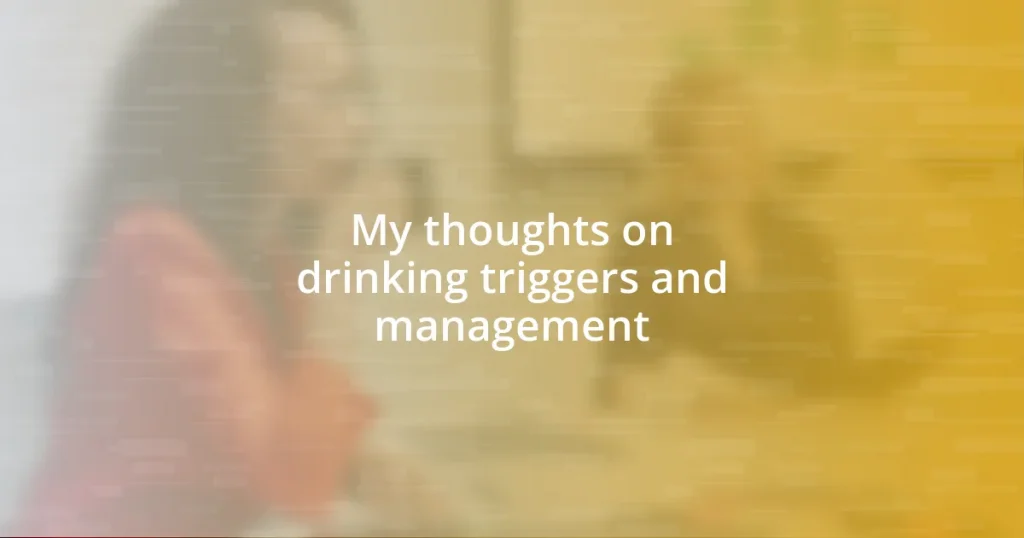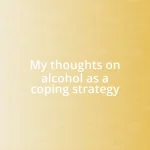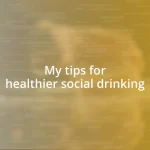Key takeaways:
- Understanding drinking triggers involves recognizing environmental, emotional, and social influences that prompt the urge to drink.
- Effective coping mechanisms include engaging in hobbies, maintaining a supportive network, and employing mindfulness techniques to manage cravings.
- Preventing relapse requires proactive strategies like creating a personal toolkit, setting clear boundaries with friends, and actively engaging in social situations.
- Building long-term success hinges on establishing a consistent routine, celebrating small victories, and continuous self-reflection to improve coping strategies.

Understanding drinking triggers
Understanding drinking triggers can be a complex journey. Reflecting on my own experiences, I recall moments when stress felt like an inescapable weight, making that glass of wine seem like the only release. It begs the question: how often do we use substances to cope with life’s pressures?
It’s fascinating how our environment can significantly influence our desire to drink. I remember attending gatherings where others raised their glasses in celebration, and despite my resolve, I felt a pull to join in. This highlights a crucial point: social situations often amplify our triggers, making it essential to recognize these cues before they lead us astray.
Moreover, unaddressed emotions can act as powerful drinking triggers. I’ve noticed that whenever I felt lonely or restless, the urge to pour a drink would creep in. It makes me wonder how many people might feel similarly, grappling with their feelings in silence while a drink offers a temporary escape. Understanding these triggers is not just about avoiding alcohol; it’s about confronting ourselves and our emotions in a healthier way.

Recognizing emotional triggers
Recognizing emotional triggers can be a profound eye-opener. Reflecting on my past, I remember feeling a rush of excitement and nostalgia during special occasions—birthdays and holidays. It was during those moments I often found myself reaching for a drink, thinking it would enhance the celebration. But it wasn’t just about celebration; it was about my emotional connection to those gatherings, which made me realize that certain events can evoke complex feelings, leading to impulsive drinking decisions.
It’s essential to pinpoint these emotional triggers to manage them effectively. Here are some that I’ve noticed in my own journey:
- Loneliness: This emotion can feel isolating, often pulling me towards a drink as a form of comfort.
- Stress: Busy work days would leave me drained, and I found that alcohol seemed to promise a quick escape, even if temporary.
- Celebration and Joy: The association of special moments with drinking can create a habit that’s hard to break, making it a go-to response when I celebrate.
- Boredom: I often reached for a drink when I felt restless, mistaking it for entertainment rather than seeking healthier distractions.
By acknowledging these triggers, I’ve learned to approach them with more awareness, which allows me to choose healthier responses moving forward.

Social scenarios and triggers
Recognizing that social scenarios can act as potent drinking triggers has been eye-opening for me. I remember a friend’s wedding where the air buzzed with joy and clinking glasses. I felt a rush to join in, as if the celebration depended on my participation. In that moment, I realized how easily the excitement around us could ignite an urge to drink, even when I had planned to stay sober.
Comparison is another psychological element that’s been significant in social contexts. I often find myself at bars or parties surrounded by friends who seem to enjoy their drinks without a care. This creates a sense of longing—almost as if I’m missing out on something essential. The pressure to conform can be overwhelming, and I’ve learned that being aware of my emotional state in such situations is crucial. More often than not, I have felt that the joy of connection can sometimes be mistakenly tied to drinking, blurring the lines of true celebration.
Awareness and preparation are vital when entering social scenarios. I make it a point to plan ahead, bringing my favorite non-alcoholic beverage. This not only keeps the pressure at bay but also allows me to enjoy the moment fully. My goal in those environments is to connect rather than conform, actively choosing to participate in the conversation and festivities without relying on alcohol as my social crutch.
| Social Scenario | Triggering Emotion |
|---|---|
| Weddings & Celebrations | Excitement & Pressure |
| Bars & Parties | FOMO (Fear of Missing Out) |
| Dinner Gatherings | Connection & Comfort |

Coping mechanisms for triggers
Coping with triggers often boils down to recognizing what truly works for us in the moment. For me, taking a step back to breathe and recenter myself has made a world of difference. I remember a particularly overwhelming day when everything seemed to pile up; instead of reaching for a drink, I opted to go for a brisk walk. It cleared my head and, surprisingly, boosted my mood without the need for alcohol. How many of us overlook the power of simple movement as an immediate stress reliever?
Another effective strategy I’ve found is engaging in hobbies that absorb my attention. On a rainy afternoon, I found myself facing the temptation of a drink while feeling a bit blue. Instead, I picked up a paintbrush, letting the colors express my feelings rather than letting them bubble into a drink. It was liberating to turn my emotions into something creative, a reminder that I could channel my energy into various outlets instead of alcohol. Have you ever noticed how diving into a passion can make time fly and distract you from cravings?
Lastly, the importance of a supportive network cannot be overstated. I often reach out to a friend who understands my journey when I’m hit with a strong urge. Just last week, during a tough moment, I called her, and after a heartfelt conversation, I felt an immense weight lift. It reinforced my belief that sharing our struggles can not only provide immediate relief but also strengthen our bond. Isn’t it incredible how talking with someone who gets it can transform our experience?

Preventing relapse with management
Preventing relapse requires a proactive approach to management, focusing on effective strategies to navigate challenging situations. I remember when I felt particularly vulnerable during a holiday gathering. Instead of avoiding the environment, I decided to engage actively with my friends by starting conversations and sharing stories, which kept my mind off the alcohol flowing around me. Have you ever noticed how shifting your focus can help you combat cravings?
Creating a personal toolkit for moments of temptation is something I’ve found invaluable. I’ve packed my bag with stress balls, affirmation cards, and even a playlist of uplifting songs. One time, feeling the urge strike at a game night, I slipped away to listen to a song that always lifts my spirits. It was surprising how a few minutes of music could redirect my thoughts and reinforce my decision to stay sober. Isn’t it fascinating how small tools can empower us in those critical moments?
Moreover, I believe in setting clear boundaries and communicating them with friends. I recall a time when I was invited out with old friends who hadn’t yet grasped my commitment to sobriety. By openly sharing my choice to remain alcohol-free, I felt a wave of support wash over me, and my friends adjusted their plans to include fun, alcohol-free activities. Have you experienced the relief that comes from expressing your needs to others? It can truly solidify your resolve and foster a stronger support system.

Strategies for long-term success
Building a foundation for long-term success means embracing a consistent routine that supports my goals. I once struggled with ups and downs, but then I started incorporating daily morning mindfulness. Just a few minutes of meditation anchored my day, reducing my vulnerability to triggers later on. Have you ever felt how just a moment of peace can set a positive tone for everything that follows?
Setting achievable goals has also been a game changer for me. Small victories, like choosing a non-alcoholic drink at social gatherings, gradually built my confidence. I remember a time I celebrated a month of sobriety by treating myself to a weekend getaway, which was immensely rewarding. Don’t you think recognizing and celebrating milestones can fuel our motivation to keep moving forward?
Finally, I’ve learned the importance of continuous self-reflection. Journaling has become a safe space for me to unpack my experiences and feelings. After a particularly challenging week, I would jot down what triggered my urges and how I responded, gaining insights that helped reinforce my strategies. Have you found that taking the time to evaluate your journey can illuminate paths for improvement? It’s fascinating how looking back can empower us for the future.















